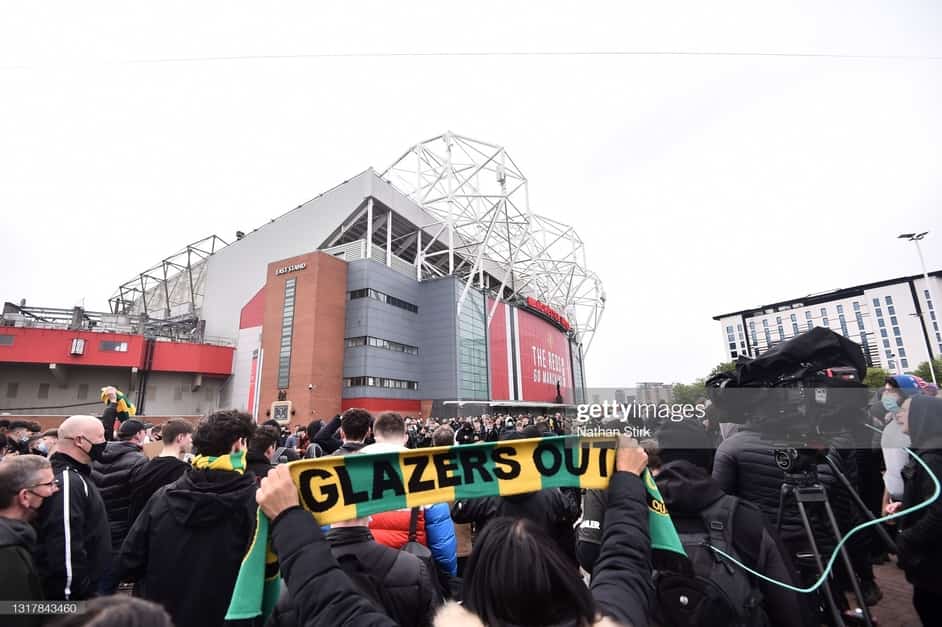The top supporter's groups of each English member club publicly went against their teams’ decision to join the league, which would see 20 of Europe’s top clubs battle it out with only five clubs entering meritocratically.
The reasons for the disdain towards the new project – which was seen as a breakaway movement from the UEFA Champions League – were numerous, but each resulted in mass fan protests at grounds up and down the country.
Within 48 hours, Arsenal, Chelsea, Liverpool, Manchester City, Manchester United, and Tottenham had all announced their departures from the controversial tournament – partially due to fan pressure. So what has changed at the top clubs since the turnaround thanks to active supporter protest and discussion?
Arsenal
Gunners fans were quick to go against their club’s decision to join the European Super League and continue to pressure the board and ownership of the club, refusing to accept the powers-that-be simply backing out of the concept. The hashtag - 'Kroenke Out' - has been prominent on social media in reference to the club’s majority shareholder, but this is yet to materialise into a takeover.
In late May, the Arsenal Supporters’ Trust started a new campaign – not simply content with a potential selling of the club from Stan Kronke. The trust began calling for an ownership stake in the club to be given to fans. This suggestion consists of two independent board directors at the club with the owner and board engaging in conversations with the fanbase in addition to independent regulation of the board and honesty, openness and transparency from those in charge. The club is yet to suggest any changes at board level that will occur.
#KroenkeOut #FansIn - get it trending by using the hashtag. We have some social assets on our website created by @stone_cd and can be used by all. https://t.co/UpIXDlSWbU pic.twitter.com/Dnd7xh3LZY
— AST (@AST_arsenal) May 23, 2021
Chelsea
Some of the most memorable scenes following the announcement of the Super League came from Stamford Bridge, where fans congregated ahead of Chelsea’s fixture against Brighton on a Tuesday night following the initial announcement of the league structure. The club was the first to announce their departure from the new tournament that evening, resulting in jubilant celebrations on the streets of West London.
Two weeks after those scenes, Chelsea announced they would allow a supporter presence at club board meetings, starting from 1st July 2021. According to the club, this will consist of three supporter advisors “to ensure general supporter sentiment is considered as part of the club’s decision-making process.”
With regards to the announcement that @ChelseaFC will introduce supporter presence at board meetings, the @ChelseaSTrust has issued the following statement ⬇️ https://t.co/Ps1x1Osfmw pic.twitter.com/P44f64ItuK
— Chelsea Supporters’ Trust⭐️⭐️ (@ChelseaSTrust) May 4, 2021
Despite the supporter presence, these three representatives will be involved in a purely advisory position and will not have voting rights, nor will they make decisions regarding players, staff, the academy and related matters.
Liverpool
Liverpool fans have often been lauded as highly involved in ensuring the club is run to the standards set by the fanbase, and the European Super League fiasco was no different.
Official fan group, Spirit Of Shankly, released a statement after the weekend of the league announcement calling for the club to include elected fan representatives on the club board following steps from owners Fenway Sports Group to push the club into the controversial tournament.
Spirit of Shankly met with the club in mid-May, resulting in a Supporter's Board, which is set to be introduced towards the start of the 2021-22 season. This board will be run by the official Liverpool Supporters Trust whilst liaising with affiliate groups to ensure true representation.
Agreement reached after talks with LFC. Link: https://t.co/qNNeGvE4q8 pic.twitter.com/uG4yAT72ps
— Spirit of Shankly (@spiritofshankly) May 20, 2021
With no representation at the club's board level, the club has said they will be holding regular meetings with the new fans Board to ensure their feelings are heard.
Manchester City
Despite Manchester City being the second club to break away from the Super League after Chelsea, there was very little active opposition in the form of physical protest to the club’s involvement away from organised fan groups.
After announcing their step away from the new league, the club apologised to the fanbase, which resulted in a joint statement from the club’s OSC and 1894 supporters groups asking to speak with club CEO Ferran Soriano. Although Soriano and the club have apologised, 1894 have commented that this is not enough without the club also going against new Champions League reforms, which will be a similar tournament format to the Super League.
Manchester United
For Manchester United fans, the European Super League was another example of failure from the current ownership. An anti-Glazer movement has been ever-present at the club since the American family became majority shareholders in May 2005.
On April 22nd, fans stormed the club’s training ground in reaction to the announcement of the Super League and Joel Glazer’s role as one of four Vice-Chairmen of the tournament. Two days later, more than 2,000 fans attended a protest outside Old Trafford calling for the introduction of the 50+1 rule seen in the top three tiers of German football. In the midst of the chaos outside Stamford Bridge, United’s Executive Vice-Chairman, Ed Woodward, announced he would be leaving his role at the club at the end of 2021.
The next game at Old Trafford – a Premier League match against Liverpool - saw more protests and a piece of history as fans broke into the stadium and forced the postponement of the fixture; the first time a Premier League game had been cancelled because of a protest.
Manchester United are yet to announce any initiatives to encourage fan representation at board or equivalent level.
Tottenham
Like at Old Trafford, the Super League coincided with an already fractured relationship between those in charge - in this case, Chairman Daniel Levy - and the fanbase.
Following the Super League announcement, the Tottenham Hotspur Supporters Trust released two statements entitled ‘No to breakaway European Super League’ and ‘The betrayal of Tottenham Hotspur,’ which called for the club board to resign. It took until 11th May for the club to respond to the fan outrage of the previous month, with a statement reading they “apologise unreservedly" for joining the Super League.
Within this statement, the club took exception to support calls that the board do not care about the club, among other issues they had with THST’s statements, a paragraph the Supporters Trust hit back on.
THST response to Club statement on fan representation 👇https://t.co/Juh8x2xojT
— THST (@THSTOfficial) May 12, 2021
The message from the club also included plans to create a club advisory panel made up of fan representatives, chaired by a non-executive member of the club board who would be appointed annually. Only for the trust to return with suggestions that the plans would not give fan representatives any true power.
Tottenham Hotspur Supports Trust and the football club set up talks with the help of the Football Supporters Association in mid-May with discussions regarding the advisory panel set to continue into the future.






































